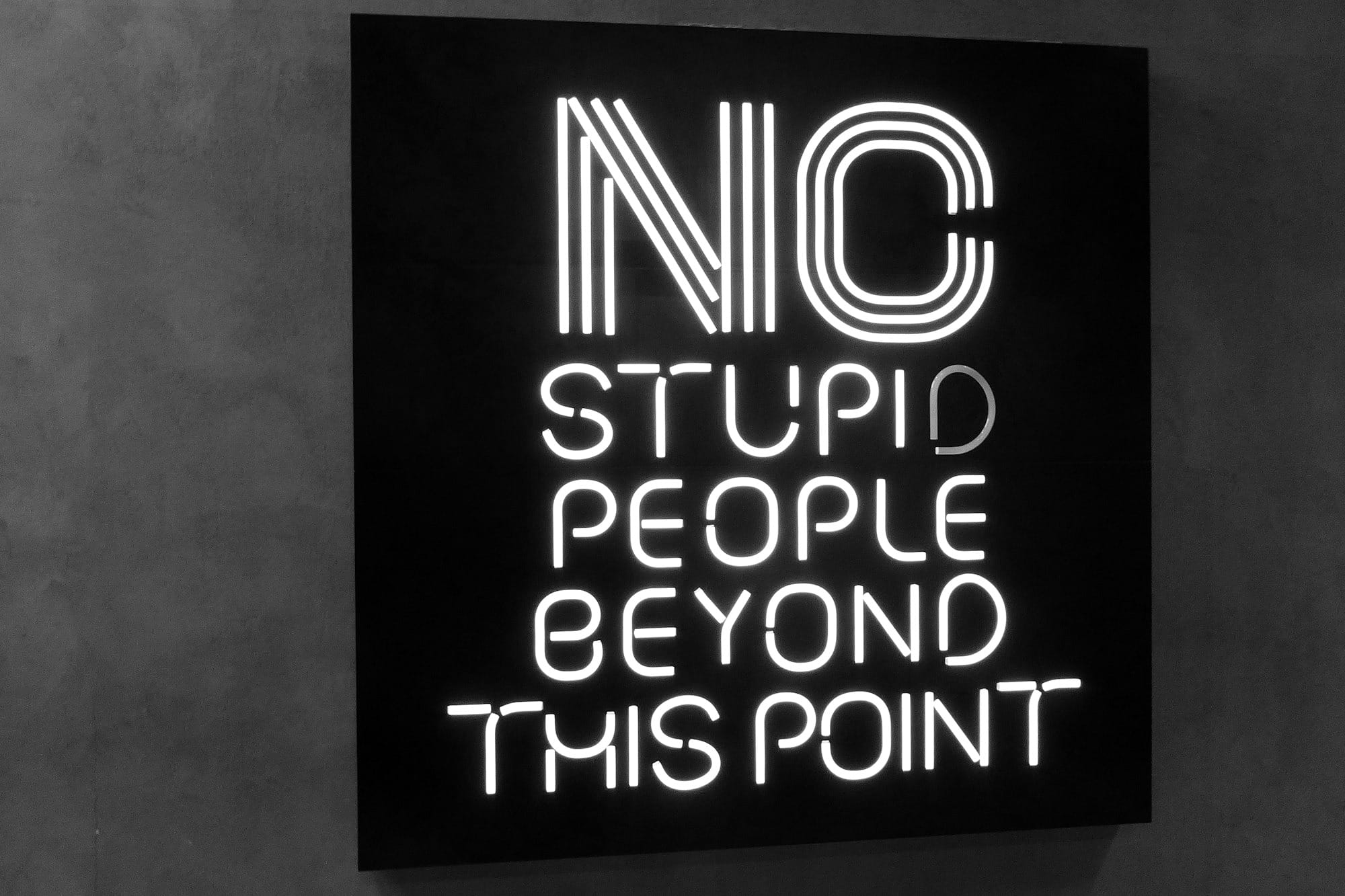How to tell if your company is stupid
Is your organisation unconsciously being stupid or are you simply ineffective?

What does it mean to be considered 'stupid'?
The Definition of 'Stupid'
Let's get technical.
According to the Google/Oxford Language dictionary to be stupid is "having or showing a great lack of intelligence or common sense".
In our essays, though, we focus on subjects such as brands and strategy. We are interested in what 'stupid' means in Economic terms.
So, what does 'stupid' mean in Business terms?
Carlo Cipolla
One set of answers is from the economic historian Carlo M. Cipolla. In 1976 he wrote an essay called "The Basic Laws of Human Stupidity".
In his thesis Economic stupidity has nothing to do with a person's lack of intelligence.
Who Benefits from Actions?
Cipolla asks two questions regarding a person's actions:
Do those actions:
(1) benefit the person?
(2) benefit others?
If the answers to both questions are 'no', the person is considered to be 'Stupid'.
The other three possibilities are that they are 'Helpless', 'Intelligent' or 'Bandits'. This can graphically be depicted as follows:

Stupid Companies
Let's now apply Cipolla's ideas to companies - i.e. to legal personalities.
Most companies in a capitalist system desire unlimited levels of success. They therefore typically have no regard for the losses of other companies (except, perhaps, to some extent, in cases such as joint ventures or other symbiotic arrangements).
In that sense capitalist organisations are thus 'bandits'.
Who are the 'others'?
An organisation's competitors are only a small subset of the universe of 'others'.
So, in our capitalist system (and it will be different under some other economic systems), it makes more sense if we exclude competitors and rather define their customers and 'society' as the 'others'.
If we do so, companies may then still have their cake and eat it: i.e., have unlimited success and be 'Intelligent'. Why? The philosophy of capitalism (if we accept that) states that acting in one's own interest (and not the interest of competitors) also serves the interests of society.
A Better Economy for All
To benefit the economy, companies must be in the top/right ('Intelligent') quadrant where they can benefit themselves, but also:
a) benefit their customers (by being customer-first) and
b) benefit society as a whole (by creating more 'good' in the economy).
Our (i.e., Cherryflava's) purpose is to help move companies into that 'Intelligent' quadrant.
The Bandits
It is clear that many (perhaps even most) successful companies fit in the bottom/right ('Bandit') quadrant. While the company may be flourishing, it is at the expense of everybody else.

This egocentric approach was cemented by the 1919 Dodge vs. Ford court case in the USA. The ruling in this case, in effect, not just condones but mandates such shareholder primacy behaviour by directors. This understanding then quickly spread to other (capitalist) parts of the globe.
Companies in a capitalist system will therefore (because they 'must') continue to pollute, exploit, and abuse the environment, and also exploit their customers and their employees. Their only constraints are (a) legal constraints and (b) avoidance of actions that may reduce the benefits to the company (i.e. part of the Business Judgement Rule).
Furthermore, these companies will lobby government to ensure that all applicable laws have as light a touch as possible on their businesses. And they will also then 'push' the interpretations of the laws to its absolute limits.
Many 'true' bandit companies certainly don't want to move into the top right quadrant. Their successes and their concomitant levels of arrogance reduce the incentives for them to do so.
Yet they are bandits. Contrary to what their beliefs may be (and these beliefs are often related to incorrect concepts such as trickle-down economics), their actions ultimately harm the economy and thus, eventually, they harm themselves too. Their application of the Business Judgement Rule is flawed.
Here's the bottom line:
Bandit companies often push up the average wealth, but they also always lower the median wealth.
The Helpless

While there are some for-profit companies that fit in the top/left (i.e. 'helpless') quadrant, we don't encounter many.
Most NGOs fit there and we assist some of them on a pro bono basis. These NGOs are economically 'Helpless' by choice. They exist to help others, often with little or no economic benefit accruing directly to themselves.
We admire many of these organisations. In fact, we often encounter efforts here that are so incredibly innovative, effective and of such great benefit to others that we typically learn much more from them than they learn from us.
The Stupid

In the South African context, there are simply just too many companies in this bottom/left 'Stupid' space. To protect their dignity, we will not mention names, except to say that many of the state-owned enterprises fit here.
Assisting the 'Stupid' is an exercise in (yes, wait for it ...) stupidity.
The Ineffectual
So, 'Bandits' don't want to be helped, there are few 'Helpless' companies, and it is not worth helping the 'Stupid'.
Who do we then work with (besides the Intelligent)?

Now that we have covered all 4 of Cipolla's quadrants, we want to point you to the middle of the graph. This ('Ineffectual') group is perhaps the largest group in South Africa - the companies that have stagnated in almost every respect; those who still implement processes and thought patterns from the middle of the 3rd Industrial Revolution.
They continue to exist. While, at times they have bad years, some of these Ineffectual companies still sometimes continue to grow when (a) their competitors move into the 'Stupid' quadrant and the company then gains market share or when (b) 'Intelligent' companies create economic growth and some of those growth benefits then accrue to the Ineffectual company.
But these companies are dead men walking. They don't innovate. They don't venture. They don't apply new thinking and, even when they do, those attempts fail because there are simply too many ineffectual behaviours in these organisations that lead to stagnation.
Stagnation
Progress inhibitors in ineffectual companies include:
- Pervasive command-and-control management styles that lead to Agile process failure. "See, we told you, this new stuff will not work".
- Too many executive dictates (from Stupid/Bandit/Ineffectual/Helpless executives) that lead to eventual employee followership-apathy. "Yes boss."
- Excessive focus on the Risk and Cost dimensions of the Cost/Risk/Benefit triangle that forces the company into the Ineffectual space.
- Bandit employees who have a vested interest in maintaining as little change as possible in order to protect their 'little empires' and/or the continued value of their knowledge-sets and skillsets.
- Corporate salary, promotion and retention processes that favour the Bandit-employees.
And, yes, there are many more such structural obstacles - ways of doing things that were designed between the end of WWII and the mid 1980s. We regularly cover many of those impediments here too.
Introspection leads to Intelligence
The leadership of these companies at the center of the graph are in great need of some type of epiphany. Many seem to not even be aware that their companies are endangered.
Are you constantly innovating?
Are you venturing?
Yes, other types of actions such as operational improvements and deal-making are great. But those actions may not be enough if changes in the environment are slowly making your overall approach and your strategy irrelevant.
Are you strengthening your brand to the point where you will (at the very least) surpass Peter Stuyvesant?
If not, your company is in the realm of the ineffectual.
You need to own up to that, and you need to take action now.
Need to develop your strategic thinking practice?
Build your brand better in 2024 with our structured 12-week program of strategy development for you and your team.
Get in touch to discuss
